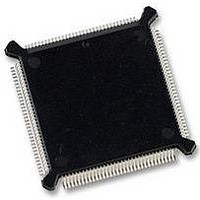MC68HC16Z1CEH25 Freescale Semiconductor, MC68HC16Z1CEH25 Datasheet - Page 246

MC68HC16Z1CEH25
Manufacturer Part Number
MC68HC16Z1CEH25
Description
IC MCU 16BIT 25MHZ 132-PQFP
Manufacturer
Freescale Semiconductor
Series
HC16r
Datasheet
1.MC68HC16Z1VEH16.pdf
(500 pages)
Specifications of MC68HC16Z1CEH25
Core Processor
CPU16
Core Size
16-Bit
Speed
25MHz
Connectivity
EBI/EMI, SCI, SPI
Peripherals
POR, PWM, WDT
Number Of I /o
16
Program Memory Type
ROMless
Ram Size
1K x 8
Voltage - Supply (vcc/vdd)
2.7 V ~ 5.5 V
Data Converters
A/D 8x10b
Oscillator Type
Internal
Operating Temperature
-40°C ~ 85°C
Package / Case
132-QFP
Package
132PQFP
Family Name
HC16
Maximum Speed
25 MHz
Operating Supply Voltage
3.3|5 V
Data Bus Width
16 Bit
Number Of Programmable I/os
16
On-chip Adc
8-chx10-bit
Number Of Timers
11
Controller Family/series
68HC16
No. Of I/o's
16
Ram Memory Size
1KB
Cpu Speed
25MHz
No. Of Timers
2
Embedded Interface Type
QSPI, SCI
Rohs Compliant
Yes
Processor Series
HC16Z
Core
CPU16
Data Ram Size
1 KB
Interface Type
SCI, SPI, UART
Maximum Clock Frequency
25 MHz
Maximum Operating Temperature
+ 85 C
Mounting Style
SMD/SMT
Minimum Operating Temperature
- 40 C
Lead Free Status / RoHS Status
Lead free / RoHS Compliant
Eeprom Size
-
Program Memory Size
-
Lead Free Status / Rohs Status
Details
Available stocks
Company
Part Number
Manufacturer
Quantity
Price
Company:
Part Number:
MC68HC16Z1CEH25
Manufacturer:
Freescale Semiconductor
Quantity:
135
Company:
Part Number:
MC68HC16Z1CEH25
Manufacturer:
Freescale Semiconductor
Quantity:
10 000
- Current page: 246 of 500
- Download datasheet (6Mb)
10.3.1 SPI Registers
10.3.1.1 SPI Control Register (SPCR)
10.3.1.2 SPI Status Register (SPSR)
10.3.1.3 SPI Data Register (SPDR)
10.3.2 SPI Pins
10-6
Error-detection logic is included to support interprocessor interfacing. A write-collision
detector indicates when an attempt is made to write data to the serial shift register
while a transfer is in progress. A multiple-master mode-fault detector automatically dis-
ables SPI output drivers if more than one MCU simultaneously attempts to become
bus master.
SPI control registers include the SPI control register (SPCR), the SPI status register
(SPSR), and the SPI data register (SPDR). Refer to
D.7.14 SPI Status
definitions.
The SPCR contains parameters for configuring the SPI. The register can be read or
written at any time.
The SPSR contains SPI status information. Only the SPI can set the bits in this regis-
ter. The CPU reads the register to obtain status information.
The SPDR is used to transmit and receive data on the serial bus. A write to this register
in the master device initiates transmission or reception of another byte or word. After
a byte or word of data is transmitted, the SPIF status bit is set in both the master and
slave devices.
A read of the SPDR actually reads a buffer. If the first SPIF is not cleared by the time
a second transfer of data from the shift register to the read buffer is initiated, an over-
run condition occurs. In cases of overrun the byte or word causing the overrun is lost.
A write to the SPDR is not buffered and places data directly into the shift register for
transmission.
Four bidirectional pins are associated with the SPI. The MPAR configures each pin for
either SPI function or general-purpose I/O. The MDDR assigns each pin as either input
or output. The WOMP bit in the SPI control register (SPCR) determines whether each
SPI pin that is configured for output functions as an open-drain output or a normal
CMOS output. The MDDR and WOMP assignments are valid regardless of whether
the pins are configured for SPI use or general-purpose I/O.
The operation of pins configured for SCI use depends on whether the SCI is operating
as a master or a slave, determined by the MSTR bit in the SPCR.
Table 10-3
shows SPI pins and their functions.
MULTICHANNEL COMMUNICATION INTERFACE
Register, and
Freescale Semiconductor, Inc.
For More Information On This Product,
Go to: www.freescale.com
D.7.15 SPI Data Register
D.7.13 SPI Control
for register bit and field
M68HC16 Z SERIES
USER’S MANUAL
Register,
Related parts for MC68HC16Z1CEH25
Image
Part Number
Description
Manufacturer
Datasheet
Request
R
Part Number:
Description:
Manufacturer:
Freescale Semiconductor, Inc
Datasheet:
Part Number:
Description:
Manufacturer:
Freescale Semiconductor, Inc
Datasheet:
Part Number:
Description:
Manufacturer:
Freescale Semiconductor, Inc
Datasheet:
Part Number:
Description:
Manufacturer:
Freescale Semiconductor, Inc
Datasheet:
Part Number:
Description:
Manufacturer:
Freescale Semiconductor, Inc
Datasheet:
Part Number:
Description:
Manufacturer:
Freescale Semiconductor, Inc
Datasheet:
Part Number:
Description:
Manufacturer:
Freescale Semiconductor, Inc
Datasheet:
Part Number:
Description:
Manufacturer:
Freescale Semiconductor, Inc
Datasheet:
Part Number:
Description:
Manufacturer:
Freescale Semiconductor, Inc
Datasheet:
Part Number:
Description:
Manufacturer:
Freescale Semiconductor, Inc
Datasheet:
Part Number:
Description:
Manufacturer:
Freescale Semiconductor, Inc
Datasheet:
Part Number:
Description:
Manufacturer:
Freescale Semiconductor, Inc
Datasheet:
Part Number:
Description:
Manufacturer:
Freescale Semiconductor, Inc
Datasheet:
Part Number:
Description:
Manufacturer:
Freescale Semiconductor, Inc
Datasheet:
Part Number:
Description:
Manufacturer:
Freescale Semiconductor, Inc
Datasheet:











